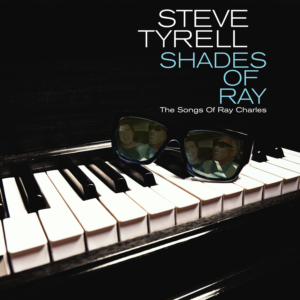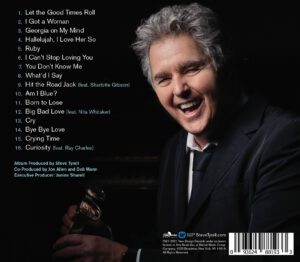 Shades of Ray – The Liner Notes
Shades of Ray – The Liner Notes
ALBUM LINER NOTES:
“When a voice can come through the radio, make you stop what you’re doing, and touch your soul, that’s powerful,” says Steve Tyrell. “And that’s what happened to me the first time I heard Ray Charles. There was nothing he couldn’t sing—blues, soul, country, standards—and growing up in Texas, I’d sit in my room for hours on end just listening to Brother Ray.”
Years later, Tyrell would find himself doing the exact same thing, hunkering down at home during the COVID-19 pandemic and playing Charles’ records on repeat as he put the finishing touches on his thirteenth studio album, Shades of Ray (The Songs of Ray Charles). Recorded in New York and LA, the collection honors the late soul icon’s towering legacy, but it’s no ordinary tribute. For starters, the record actually includes Ray Charles himself, who appears here on a previously unreleased duet with Tyrell, as well as a song Steve wrote specifically for Ray and Diana Ross. Tyrell’s interpretations of the classics, meanwhile, are both deeply reverent and boldly original, with sweeping, cinematic arrangements that land somewhere between the lush orchestration of the Great American Songbook and the old school rhythm and blues he cut his teeth on growing up in Houston. The result is a singular, wide-ranging take on one of the most revelatory artists of the 20th century, a joyful, exuberant celebration not only of Charles’ well-established place in the American pantheon, but of his profoundly personal impact on Tyrell’s own life and work.
“Sometimes when you meet your idols, they don’t turn out to be what you expected,” Steve reflects. “But my experiences with Ray were everything I could have hoped for and more. Hearing our voices together and producing and writing some songs for him was a thrill of a lifetime.”
An accomplished artist, producer, and composer who’s collaborated with everyone from Rod Stewart and Linda Ronstadt to Dolly Parton and Stevie Wonder, Tyrell toyed with the idea of paying tribute to Charles for much of his career, but it wasn’t until the coronavirus pandemic ground much of the live music industry to a halt that he was finally able to complete the project, wrapping up recording in 2020 around what would have been Charles’ 90th birthday. While Shades of Ray boasts an all-star cast of musicians including keyboardist Chuck Leavell (The Allman Brothers, The Rolling Stones) and late trumpeter Lew Soloff (Blood, Sweat & Tears, Gil Evans), as well as orchestrations from legendary arrangers Alan Broadbent (Paul McCartney, Diana Krall) and Bob Mann (Rod Stewart, James Taylor), it’s Tyrell who shines brightest here, his rich, captivating voice infusing the songs with the kind of warmth and vitality that can only come from a lifelong relationship with the music.
“Ray’s versions of these songs are so timeless that there’s no point in trying to copy him,” Tyrell explains. “What I tried to do is take the influence he’s had on me over the years and let that inspire performances straight from my heart.”

Tyrell’s honest, intimate approach proves to be an ideal lens through which to explore Charles’ wonderfully diverse catalog, and the Shades of Ray tracklist runs the full emotional and stylistic gamut, from punchy, horn-fueled funk and big band swing to tender torch songs and romantic ballads. Perhaps the album’s most memorable moment, though, comes from its bonus track, “Curiosity,” a previously unreleased recording that features Tyrell and Charles dueting on the theme song to the 1989 CBS series Snoops. The tune was one Tyrell had written specifically for Charles, and he recalls the recording session (from which Shades of Ray draws its cover art) as if it happened yesterday.
“I played Ray the track in the studio and he just said, ‘Beautiful man, beautiful,’ which was the greatest thing I’d ever heard, especially since this was the first time he’d ever agreed to sing a title song for a TV series, and I wrote it,” says Tyrell. “We had to re-write some of the lyrics to match changes that had been made to the show’s title sequence, so Ray had me sing him each re-written line one at a time so he could sing them back to me. I had a smile on my face for months after that. Can you imagine how thrilling it was to sing my words to Ray Charles and have him sing them back to me?”
Though his work with Charles was particularly meaningful, brushes with greatness weren’t uncommon for Tyrell, who helped shepherd nearly a dozen GRAMMY-winning albums and songs during his career as a producer, contributing to big hits with such legendary artists as Rod Stewart, Linda Ronstadt, and Aaron Neville, just to name a few.
“My career has had a mind of its own,” laughs Tyrell. “I always loved music, but even though I’ve worked with so many incredible people, it was never my intention to become an artist myself and release my own albums.”
Born and raised in Houston, Tyrell began his unlikely odyssey through the music industry as a teenager, when he took a job working with a local distributor handling releases for labels like Atlantic and Motown. Tyrell’s work promoting records eventually led him to New York City, where, at the age of 19, he landed a gig with Florence Greenberg’s seminal Scepter Records label. As a promotion director, staff producer, and A&R man, Tyrell would oversee sessions by everyone from Burt Bacharach and Dionne Warwick to Chuck Jackson and The Shirelles, work with legendary engineer Phil Ramone, and sign Ronnie Milsap and B.J. Thomas to their first record deals.
From Scepter, Tyrell moved to LA, where he would garner multiple Emmy nominations while supervising and writing music for film and television projects helmed by the likes of Steven Spielberg, Tom Hanks, Nancy Meyers, Charles Shyer, Steven Soderbergh, and Aaron Spelling. Oftentimes while working on a production, Tyrell would record a reference track using his own vocals, only to later hear from producers and directors that they’d like to keep his version in the final cut. It was always flattering when it happened, but the idea of pursuing a singing career still failed to register on Tyrell’s radar until 1991, when his performance of “The Way You Look Tonight” in Father of the Bride landed him his own record deal with Atlantic, who released his debut album, A New Standard, to widespread critical and commercial success. Tyrell’s subsequent offerings would go on to follow suit, with 11 of his 12 studio releases landing in the Top 5 on the Billboard Jazz Chart (including his most recent album, A Song For You, which hit #1 in 2018). Those recordings would garner Tyrell invitations to sing everywhere from Carnegie Hall and the Hollywood Bowl to The White House and Buckingham Palace, earn him performances with world-renowned orchestras like The Boston Pops and The Nashville Symphony, and help land him his own drive time, daily radio show on KJAZZ 88.1 FM in Los Angeles. When Bobby Short passed away in 2005, Tyrell was asked to take over the prestigious holiday residency at New York’s Café Carlyle, where his audience on any given night might include Bill and Hillary Clinton, Rod Stewart, Sting, David Foster, Katherine McPhee, Kristin Chenoweth, Al Roker, Katie Couric, Candice Bergen, Frankie Valli, or Neil Young. The Los Angeles Times proclaimed that “Tyrell has one of the most gratifying Cinderella stories in present day popular music,” while The New Yorker hailed him as a “gruff voiced charmer,” and The New York Times raved that his “sizable voice filters Louis Armstrong through Ray Charles and Dr. John.”
“Even when I was singing the standards, I always came from a bluesier place than some of the other artists I loved and respected like Frank Sinatra or Tony Bennett,” says Tyrell, “and that’s because of Ray. I remember listening to his records early on and thinking, ‘If I ever made an album, that’s the way I’d want to do it.’”
And so Shades of Ray brings everything full circle for Tyrell. Listen closely and you’ll hear a through line in these recordings, one that stretches back not only to Tyrell’s debut as an artist (which he recorded for the same label as Charles, and at the urging of Ahmet Ertegun, the same man who’d originally signed him), but to his boyhood in Texas, when he first heard Ray’s soulful voice come pouring out of the radio in his parents’ kitchen. It’s impossible not to feel the appreciation and respect flowing through these tracks, to sense the genuine admiration and gratitude behind each performance. In the end, Shades of Ray isn’t just an homage to Ray Charles, it’s a heartfelt thank you for a lifetime of joy and inspiration.
– Anthony D’Amato
